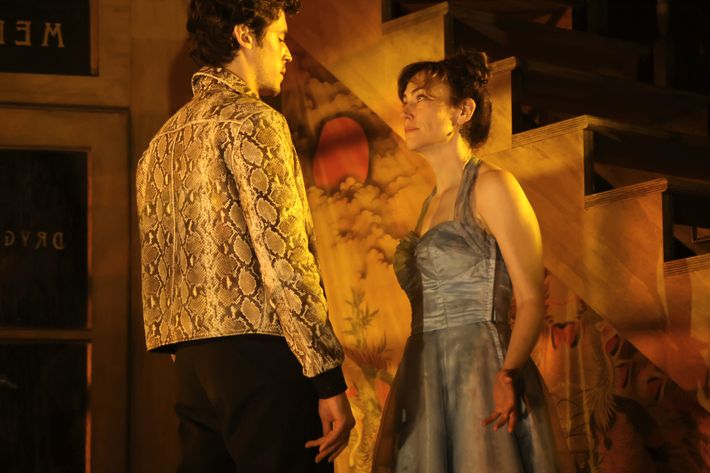
A sports team can’t rely just on the strength of a star player. That’s a major point being made in practice and performance (of, in many scenes, sports practice) by Flex, Candrice Jones’s drama about a high-school girls’ basketball team fractured by ego and circumstance. It’s 1998, and the team’s point guard Starra (Erica Matthews) is hoping to make it to the state championships, where she might get noticed by college recruiters and perhaps make it to the new WNBA. She’s hamstrung, however, by petty jealousy of her team’s new star Sidney (Tamera Tomakili), who’s transferred into town from California and already getting overtures from top schools. There’s also the fact that her teammate April (Brittany Bellizeare) is pregnant, and even though April wants to keep playing, their coach won’t let her, which means the team’s losing an experienced player right when they need her.
Starra insists upon herself as the hero of this story. She delivers monologues to the audience between scenes, and when the play starts, she’s organized a practice in her own dusty backyard where the girls are wearing fake pregnancy bellies in solidarity with April. Jones’s script works to push back against Starra’s self-importance. She insists that she has to play dirty to get ahead—and, we learn, has already committed a petty act of sabotage against Sidney—but the playwright insists on the complexity that Starra would rather ignore. No surprise that the title refers to an offensive strategy that depends on the players’ sharing the ball.
In Flex, the Mitzi E. Newhouse’s thrust has been done over into a half-court (by Matt Saunders) and practices and games play out onstage. Director Lileana Blain-Cruz, who herself played high-school basketball, seems to have been a great coach, because the action has a believable rigor and rhythm. Blain-Cruz can lean into maximalism, as she did directing White Girl in Danger or The Skin of Our Teeth, and occasionally that propensity pops up here—a car gets disassembled during a scene change with the actors inside, just for fun—but for the most part she keeps the focus on the action and athleticism. We have to believe in the girls’ talent so that we understand how frustrating it is that it’s unrecognized. To that end, Matthews, as Starra, nails the difficult task of hitting a few baskets of story importance (it’s the kind of thing that makes you ponder what fallback dialogue they have prepared if anyone happens to miss a shot). She’s stone-cold, as an audience member near me muttered to her friend, approvingly, on the way out.
There’s an obvious similarity between Flex and The Wolves, Sarah DeLappe’s play about a girls’ soccer team that played at the Newhouse a few years ago, though Flex spends more time away from the court. It’s the right move for the story—we need to know more about who these girls are to challenge Starra’s assumptions—but Jones’s writing tends toward deadening exposition as she tries to place all this in context. Characters sometimes suddenly express reams of backstory all at once, as when April explains her feelings about her pregnancy and family trauma in a monologue that, no matter how well Bellizeare delivers it, comes off self-consciously drafted. The characters talk about sex a lot, as teenage girls do, and the ambient possibility of getting pregnant haunts them. Jones is great at exploring the anxiety lingering in these characters’ lives, how it comes up in conversation even when they’re casually hanging out watching TV, but she pulls back her lens when that anxiety moves to the center of the frame. A conversation between April and her coach (Christiana Clark, finding the sweet spot between grumpy and genuine) about how her decision about her pregnancy should be her own is true but nonspecific, and falls in the dangerous zone of generating self-congratulatory nonprofit-theater-audience applause. It’s better when the characters speak to us as people rather than archetypes.
Flex works best when Jones gives the teammates more room to be messy and contradictory. A key supporting player is Ciara Monique’s Cherise, a girl who’s got dangerous levels of youth-pastor energy but is also queer and trying to reconcile her impulses. Monique has a knack for landing the comedy in the moments when Cherise is naïvely oblivious. But she and Jones don’t look down on the character, as much as someone like Starra might. She’s a part of the team, and you have to reckon with all she brings to the court.
Flex’s ensemble is its subject and its point. In Orpheus Descending, another summer run of a play set in the sweltering South, the production hangs fully on a key star turn: Maggie Siff, as the flinty Lady Torrance. Siff, who can convey so much with just the motion of her eyebrows, was born to play Tennessee Williams’s women, even in lesser Tennessee Williams plays. The character here is the daughter of a Sicilian bootlegger, her father killed by Klansmen years ago, who has married a rich man in order to secure what stability she could. She now manages his dry-goods store, where all the action of the play occurs, as he lies in his sickbed upstairs. Lady is an outcast in a county filled with busybodies, though she soon latches onto and hires a sexy, mysterious guitar player named Valentine Xavier (played by Pico Alexander) who’s drifted into town.
You need something explosive to build between Val and Lady over the course of the play to buy into this affair, but a problem, right off the bat, is that Siff blows Alexander out of the water. He’s aiming for handdog melancholy, but his handsomeness is of the squeaky-clean variety, and he can’t bring out the outlaw-poet grit that Williams ascribes to the character. To be fair, Williams himself is tangled up here on his own more baroque instincts; one speech involves Valentine giving a thudding description of a bird that flies everywhere but never lands … we get it! But then you watch Siff, across from Alexander, and you see her carry off Lady with perfect clarity. She brings out the humor, but also lets you see Lady’s humor as defensiveness: a person all closed up and on guard because it’s safer that way. The difference in finesse makes for an unbalanced romance. She’s real. He’s a sketch of a character type. What does she see in him?
As Orpheus winds on, Siff slowly and precisely unfolds, and it’s a joy to watch her do so, even as things around her stay blurry. Not just Alexander’s Val, but all the other characters are thinly drafted and thinly acted. Julia McDermott, playing the tragic wayward over-mascara’d woman Carol Cutrere, keeps throwing herself at Valentine in big monologues that grate on him and also all of us. Erica Schmidt, directing, has locked into something in the way that Lady Torrance has been othered by everyone around her—Siff and Alexander sometimes play scenes way to the side of the stage, outside the borders of Amy Rubin’s dollhouse-like wooden set—but doesn’t seem sure about what to do in the scenes without her. With the myth of Orpheus and Eurydice in mind, I could think of this all taking place in a strange, underworldlike county, with just one person trapped there, among a bunch of apparitions.
Flex is at the Mitzi E. Newhouse Theater.
Orpheus Descending is at Theatre for a New Audience’s Polonsky Shakespeare Center.



